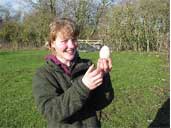Cold weather failed to stop rare geese laying on time at WWWT Slimbridge

It was a long harsh winter but the world’s rarest species of goose has been busy laying eggs at Slimbridge Wetland Centre.
Aviculturists at the Centre had feared the cold weather would delay the Hawaiian geese from laying eggs.
But their fears turned out to be unfounded as the geese have laid on time and there are currently 22 sat on nests.
In fact there are more than 80 eggs this year and the first are set to hatch just before the middle of March.
The Hawaiian goose or Nene was famously saved from extinction by Sir Peter Scott, the founder of the Wildfowl and Wetlands Trust which has its headquarters at Slimbridge.
The nene population fell to only 30 birds in 1951 in Hawaii so he decided to bring back three of them to breed here at Slimbridge.
He was able to release back into the wild the first Slimbridge-reared Nene in 1962, marking the start of the recovery of the world’s Nene population.
Almost 50 years later, the Nene has become one of WWT’s oldest and most famous success stories and it is from the breeding of these three geese that we have the healthy population at Slimbridge.
These naturally tame geese now wander round the grounds of Slimbridge but although numbers in Hawaii have been boosted they still remain the rarest goose in the world.
Morwenna Rothery, grounds warden, has been looking after them this year. She said: “It has been a bitterly cold winter so we were worried about what effect this would have on the Nene breeding season as they among the earliest birds to lay at Slimbridge.
“We are delighted though that they have had such a strong start and it seemingly hasn’t affected them.
“It is easy to forget how rare they are worldwide when you work at Slimbridge. I was showing my younger brother around Slimbridge and he kept saying I don’t understand how they are the world’s rarest goose – they are everywhere!
“They are popular with visitors as they are very tame and feed out of people’s hands.
“I have been checking on all the nests each day testing which eggs are fertile and that the parents have all the shelter and food they need.
“I’m really excited about the eggs hatching soon and welcoming the first new arrivals of the year.”
Explore Gloucestershire
4 March 2011
OTHER NEWS
